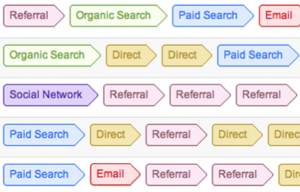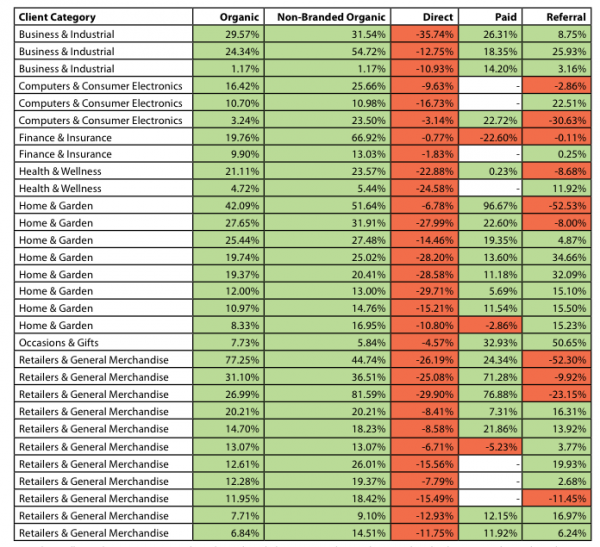Report: More Complex Attribution Model Shows Organic Search Significantly Undervalued By Marketers
Marketing firm Slingshot SEO is picking up where Microsoft left off. Five years ago Microsoft/Atlas began trying to educate marketers and the marketplace about the fact that more online sources than the “last click” were responsible for conversions. This was partly an effort to undermine the centrality of Google, which gets lots of credit for […]

This morning Slingshot SEO is releasing a fascinating report (registration required) that also argues marketers are placing too much emphasis not only on the “last click” but also the “first click.” It shows how the value and potential priority of various digital marketing channels change if one uses a “multi-touch attribution model.”
Year-Long Study Analyzed 23 Million Conversions
The year-long 2011 study “analyzed over 23 million multiple-interaction conversions across 30 domains, which include large retailers and service providers.” It assigned equal value for each visit or step in the conversion path.
Slingshot SEO explains this “flat multi-touch attribution model”:
For example, in the following series of interactions leading to a conversion, each of the five interactions is credited with an equal portion of the conversion value: Organic Search ($20) > Referral ($20) > Social Network ($20) > Email ($20) > Direct ($20) = $100 conversion. In this case, each channel receives the conversion value divided by the number of interactions in the chain.
Direct Visits Getting Too Much Credit
The company reported that for these 30 clients, “‘direct visits’ were getting more credit for conversions under a last-touch model, as they
were often the last interaction before a conversion. As a result, other channels like ‘organic search,’ ‘paid advertising,’ and ‘referrals’ were typically undervalued.” Slingshot SEO said that consumers on average “took 2.79 interactions before converting” and that the final touch or step before the conversion “was typically a direct visit to the site or a branded keyword search.”
The chart above shows the channels that were overvalued and undervalued by Slingshot SEO clients. The negative (orange) cells reflect how much the channel was overvalued; the green or positive cells indicate the percent by which the channel was undervalued.
Organic Search Worth 77 to 81 Percent More than Thought
Organic search was the most consistently undervalued channel. Slingshot SEO’s attribution model argues that “‘organic search’ should have been worth as much as 77.25% more than previously thought, and ‘non-branded organic’ should have been worth as much as 81.59% more.”
It should be mentioned that organic SEO is part of what Slingshot SEO does for a living and so the conclusions and implied recommendations of the report do serve its interests. In addition, the equal weighting of each “touch” is hypothetical and doesn’t necessarily reflect the actual value of each channel in the conversion process. However this is the identical methodology that Microsoft/Atlas was advocating.
Having said all that, the multi-touch attribution model does start to expand the aperture and get marketers to think more holistically about consumer behavior, as well as the fact that multiple influences do play in every purchase decision. As we’ve known for a number of years, consumer search behavior doesn’t exist in a vacuum and is typically stimulated by some event, ad or other influence — often from traditional media or interactions in the “real world.”
Opinions expressed in this article are those of the guest author and not necessarily Search Engine Land. Staff authors are listed here.
Related stories
New on Search Engine Land
